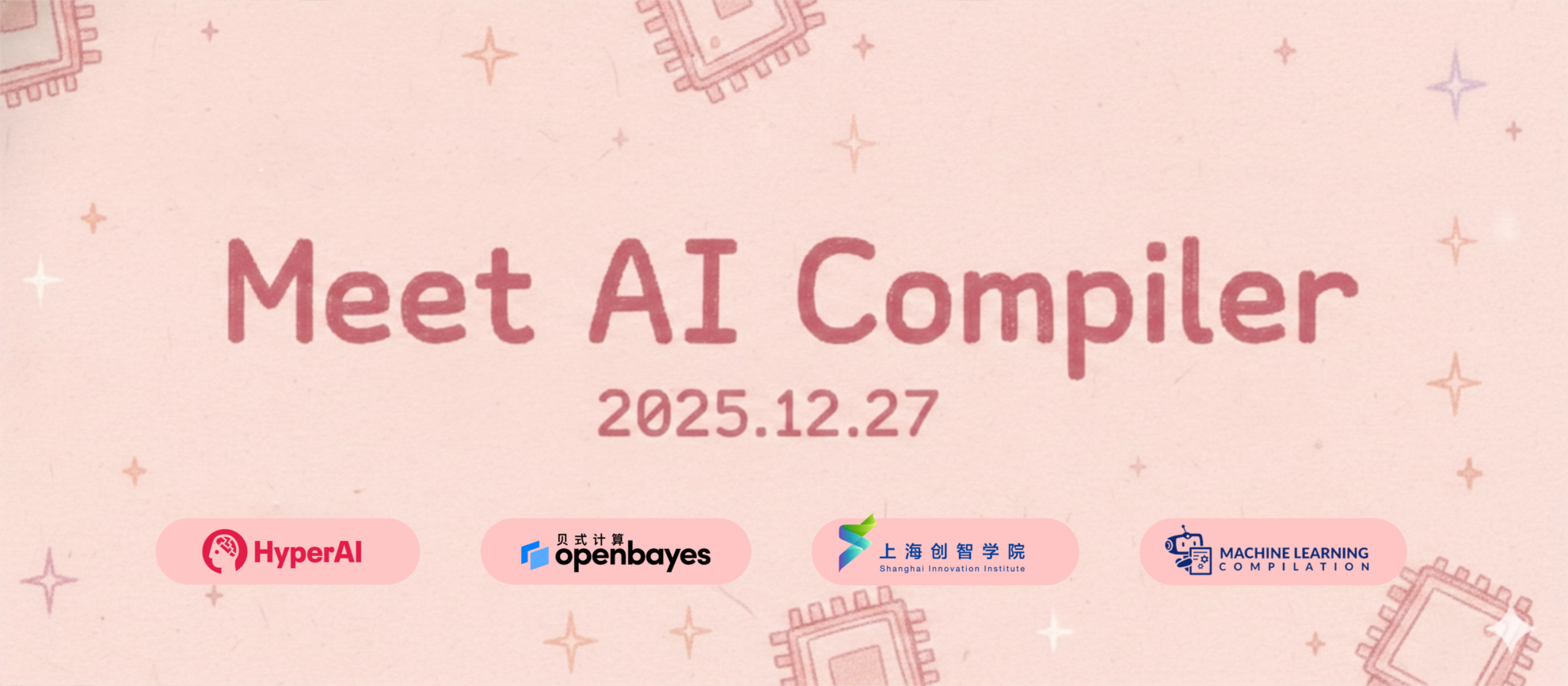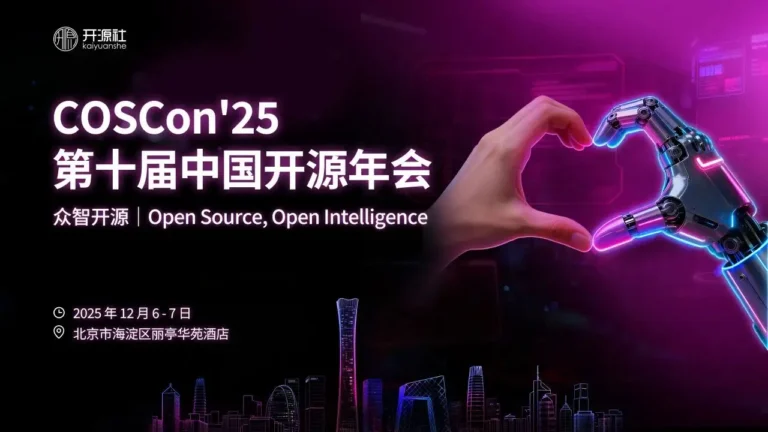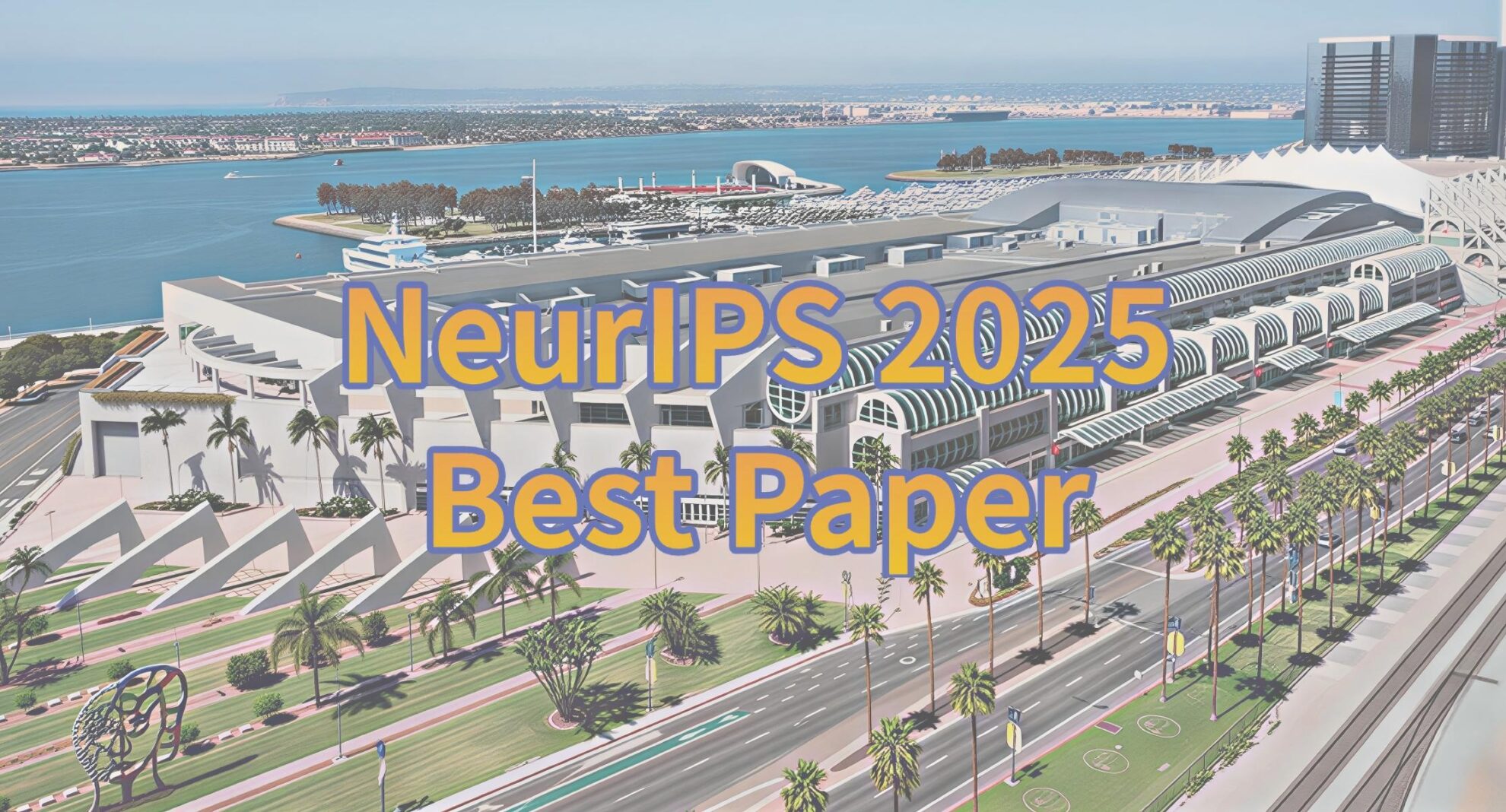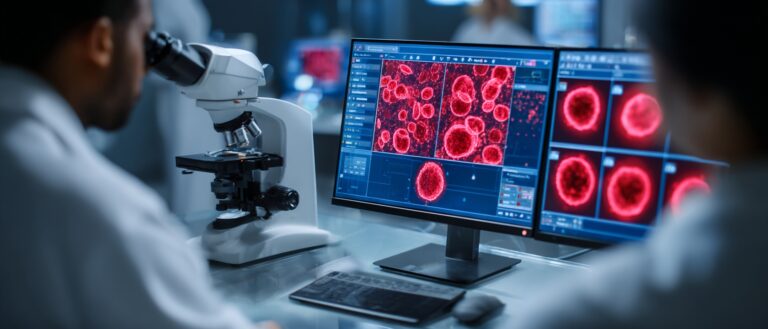Command Palette
Search for a command to run...
Free Tickets丨countdown to the Opening of the AI for Science Academic Forum, Experts From Shanghai Jiaotong University/Zhejiang University/Tsinghua University/OpenBayes and Other Experts Gathered in Beijing
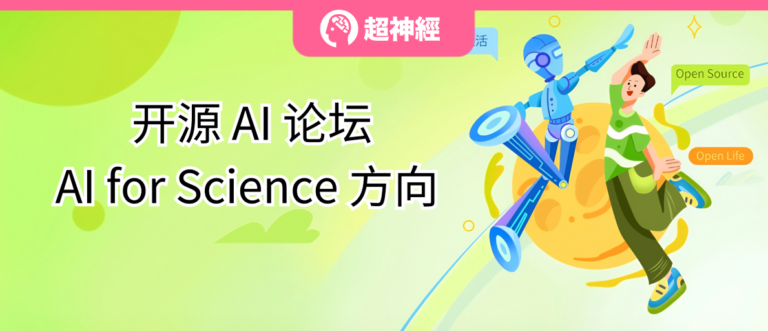
COSCon'24, the 9th Annual China Open Source Conference and Open Source Society's 10th Anniversary Carnival, will be held on November 2-3, 2024 at the Zhongguancun National Innovation Demonstration Zone Conference Center. HyperAI will serve as a co-producing community and host an open source AI forum on AI for Science during the conference.
We have prepared 10 free tickets for everyone. Participate in the draw and you will have a chance to attend the conference for free!
Win free tickets in a draw
Prize Details
* First Prize:There are 4 tickets in total. The winner will receive 1 "Open Source Support Ticket", which includes lunch and a gift pack for the conference.
* Second Prize:There are 6 tickets in total, and the winner will receive 1 "Open Source Invitation Ticket", which only includes the ticket, but does not include lunch and conference-related gift packs.
How to participate
Follow the HyperAI official account, reply "AI4S Forum" in the background, and click on the lucky draw page to participate in the lucky draw.
For this forum, we have invited four experts who have been deeply engaged in the field of AI for Science (AI4S) for a long time. They will focus on scientific research fields such as medical health, geographic information science, and spatiotemporal complex systems, and bring in-depth technology popularization and industry development trend analysis from different perspectives of academic research and industry applications.
At the same time, HyperAI also set up a booth on site and prepared fun activities and exquisite gifts for everyone. Everyone is welcome to come and play!
Forum Information
⏰ time:November 2 (Saturday) 14:00-17:30
📍 Place:Yuquanshan Conference Room, Beijing Zhongguancun National Independent Innovation Demonstration Zone Exhibition Center
🙌🏻 Sign up:Scan the QR code below to register

Scan the QR code and remark "AI4S" to join the discussion group

📝 schedule:
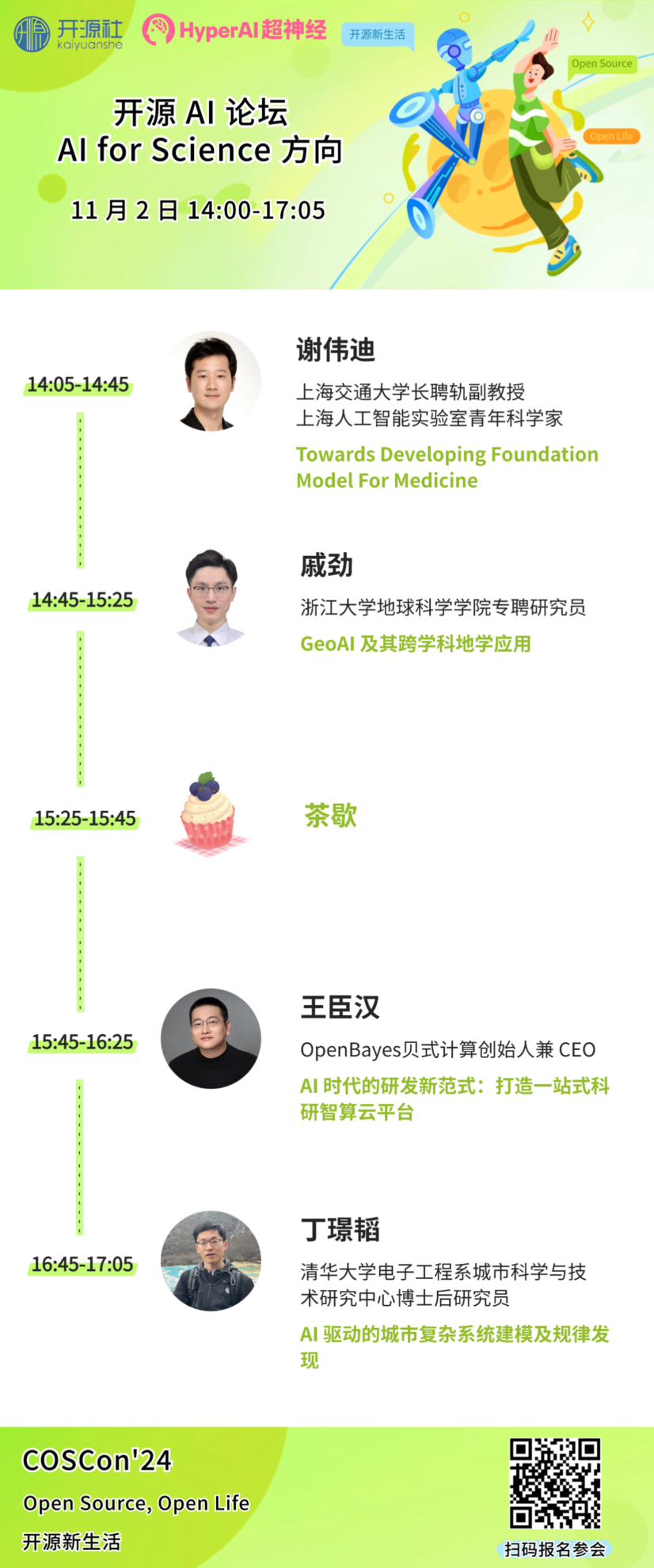
Forum Co-Producer

Personal Profile:He has more than 8 years of experience in developer relations and technical community operations, and has worked for companies such as Nuggets and ByteDance.
Brief introduction of guests and content

Share topic:Towards Developing Foundation Model For Medicine
Contents:In recent years, foundation models have achieved unprecedented success in computer vision and natural language processing. However, despite the huge potential in the medical field, the development of foundation models in this field is still relatively lagging.
The report will introduce the team's efforts and attempts in medical artificial intelligence (AI4Health) from the following aspects:include:
(1) Construction of open source datasets, such as PMC-OA, RP3D, RadMD, etc.;
(2) Training medical-specific language models or visual-language models, such as PMC-LLaMA, MMedLLaMA, PMC-CLIP, RadFM, etc.;
(3) Enhanced representation learning and general segmentation models for medical knowledge, such as X-ray, pathology, or broader radiological images, such as KAD, KEP, SAT, etc.
Personal Profile:Professor Xie Weidi is a recipient of the National Excellent Young Scholars (Overseas) and Shanghai (Overseas) High-level Talent Program, the Youth Project Leader of the Ministry of Science and Technology's Science and Technology Innovation 2030 - "New Generation Artificial Intelligence" Major Project, and the Project Leader of the National Natural Science Foundation of China.
He received his Ph.D. from the Visual Geometry Group (VGG) at the University of Oxford, where he studied under Professor Andrew Zisserman and Professor Alison Noble. He is one of the first recipients of the Google-DeepMind full scholarship, the China Oxford Scholarship Fund (Magdalen Award), and the winner of the Oxford Excellence Award from the Department of Engineering at the University of Oxford.
His main research areas are computer vision and medical artificial intelligence. He has published more than 60 papers, including CVPR, ICCV, NeurIPS, ICML, IJCV, Nature Communications, etc., with more than 11,000 citations on Google Scholar. He has won the Best Paper Award and Best Poster Award, Best Journal Paper Award, and MICCAI Young Scientist Publication Impact Award (Final List) at top international conferences and seminars many times. He serves as a reviewer for Nature Medicine and Nature Communications, and is the field chair of the flagship conferences in the field of computer vision and artificial intelligence: CVPR, NeurIPS, and ECCV.

Share topic:GeoAI and its interdisciplinary geoscience applications
Contents:Artificial intelligence has become an important theory and method in earth science. The team has deeply integrated AI technology into traditional geoscience analysis methods, proposed a spatiotemporal intelligent regression model system, and successfully applied it to marine ecological environment modeling, spatial estimation of atmospheric pollutants, urban housing price research and other fields.The report will introduce the basic theory of the system and its application in AI for Earth Science.
Personal Profile:Dr. Qi Jin's research direction is artificial intelligence oceanography and the development of geoscience big data analysis platforms. He has presided over sub-projects of the "14th Five-Year Plan" National Key R&D Program, National Natural Science Foundation and other projects. He has served as the technical leader of systems such as the Global Argo Data Sharing Service Platform, BGC-Argo Visualization Platform, and Zhejiang Nearshore Waters Ecological Environment Multi-source Information Intelligent Service Platform. He won one first prize in the Marine Engineering Science and Technology Award and is committed to interdisciplinary research such as geospatial statistics, marine ecological environment modeling, and spatiotemporal intelligent platform development.

Share topic:A new paradigm for R&D in the AI era: building a one-stop scientific research intelligent computing cloud platform
Contents:The 2024 Nobel Prizes in Physics and Chemistry were awarded successively to scientists in the field of AI, which has once again attracted the attention of the scientific research community to AI for Science in a formal and officially recognized capacity.This sharing session will focus on industry cases and introduce how OpenBayes Bayesian computing, as an infrastructure, can help AI for Science through its own scientific research intelligent computing cloud platform and collaborate with researchers to solve practical implementation problems in applications.
Personal Profile:Wang Chenhan has worked for world-renowned companies such as Walt Disney Interactive Media Group and AVOS Systems. He is the Secretary-General of the Chinese Semantic Understanding Benchmark CLUE Foundation and the Deputy Director of the Joint Research Center for Peking University Computing.

Share topic:AI-driven modeling and law discovery of urban complex systems
Contents:Cities are complex systems at multiple scales. The massive amount of real data accumulated in the real world makes them an ideal application scenario for automatic modeling methods of complex systems.This report covers two main types of issues in urban complex systems.
* Forecasting and simulation:Predicting the long-term evolution and resilience of complex systems is crucial for urban infrastructure and ecosystems. This report will introduce physical information fusion neural network (PINN), neural ordinary differential equations (Neural ODE) and diffusion generative model (Diffusion Generative Model) technologies to overcome the modeling difficulties based on real data.
* Pattern discovery:Based on real data, the dynamic inference method of the aforementioned complex system can be used to discover the inherent evolution laws of the urban system. Taking the movement of people as an example, compared with the classic "social force" physical model (Social Force), the new physical formula extracted based on real data can better simulate the movement of people in various scenarios.
Personal Profile:Dr. Jingtao Ding's main research direction is the generative modeling and application of AI-driven spatiotemporal complex systems. He has published more than 50 academic papers in international conferences and journals such as NeurIPS, ICLR, KDD, WWW, AAAI, and IJCAI.
He also serves as the Academic Editor of PLOS Complex Systems and a PC member of international conferences such as KDD, NeurIPS, ICML, ICLR, and AAAI. He has won the Best Poster Paper Award at the 2018 World Wide Web Conference (WWW 2018), the Best Paper Award at the IEEE IWCWC 2019 International Conference, and the ACM HotPOST 2015 Best Paper Award.
About the event
COSCon'24, the 9th China Open Source Annual Conference and the 10th Anniversary Carnival of the Open Source Society, is an annual open source event. During the two-day conference, there will be not only wonderful Keynote speeches, but also a variety of special forums/hands-on labs/community reunions. It is expected that more than 2,000 people will participate in this event on site, and more than 10,000 viewers will "cloud attend the conference" in the form of online live broadcast.
About HyperAI
HyperAI (hyper.ai) is a leading artificial intelligence and high-performance computing community in China. It aims to help developers and enthusiasts in the data science and artificial intelligence industries learn, understand and practice by providing services such as accelerated data set downloads, online tutorial demonstrations, in-depth paper interpretation, and top conference calendar integration, and to build the future of artificial intelligence together with the community.
In terms of content, HyperAI focuses on the latest scientific research results of AI for Science and tracks academic papers in top journals such as Nature and Science in real time.So far, we have completed the interpretation of nearly 200 AI for Science papers and released the Awsome AI for Science open source project on GitHub.It covers many popular fields such as materials chemistry, biopharmaceuticals, astrophysics, urban planning, and weather forecasting.
In terms of academic cooperation, HyperAI has established in-depth relationships with more than 60 universities and research groups, including Tsinghua University, Beijing University, Zhejiang University, Institute of Physics of the Chinese Academy of Sciences, etc. It has been receiving contributions from research groups for a long period of time, collaborating in organizing online and offline activities to share the results of the AI4S technology and hosting a series of live broadcasting activities called "Meet AI4S".
With an open mind, we are committed to promoting the generalization and scale development of AI4S in China, and invite experts, scholars, researchers and technology enthusiasts in related fields to participate in our forum!
Scan the QR code below to register↓

